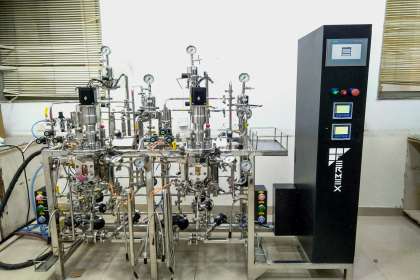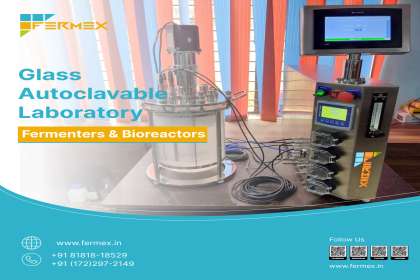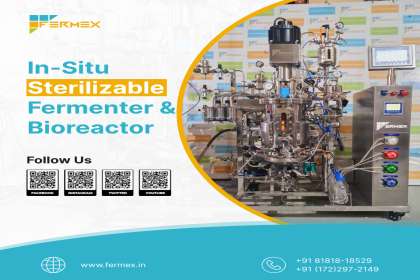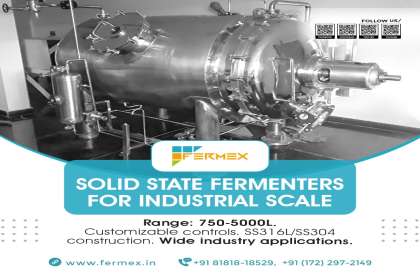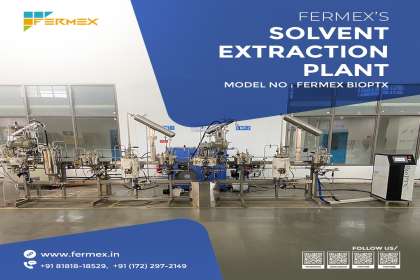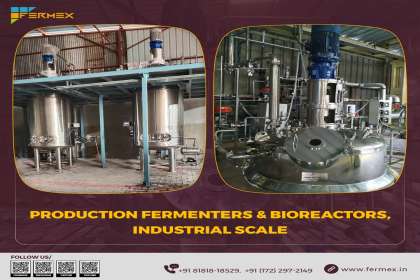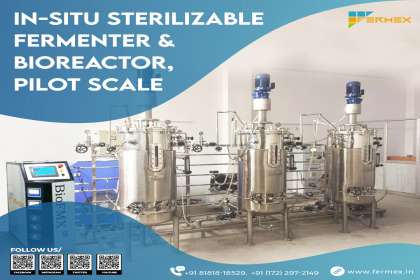Enhancing API Production Leveraging the Benefits of Fermenters

Use of Fermenter in Pharmaceutical Product (API) Production
Fermenters play a crucial role in the production of pharmaceutical Active Pharmaceutical Ingredients (APIs) through fermentation processes. Fermentation is a biological process that utilizes microorganisms, such as bacteria or fungi, to convert raw materials into desired products. In the pharmaceutical industry, fermenters are commonly used to produce a wide range of APIs, including antibiotics, enzymes, vaccines, and therapeutic proteins.
- Fermenters are essential tools in pharmaceutical API production as they enable controlled microbial growth, optimize API yields, ensure product quality, and facilitate large-scale production. They contribute to the efficient and cost-effective manufacturing of pharmaceutical products that rely on fermentation-based processes.
Key stages involved in process of making Pharmaceutical Product ( API) using Fermenters
The process of making a pharmaceutical product (API) using fermenter involves several key stages. Here are the primary stages involved in the process:
1. Microbial Culture Preparation: The first step is to obtain a pure culture of the microorganism responsible for producing the desired API. This can involve isolating the microorganism from natural sources or obtaining a well-characterized strain from a culture collection. The culture is then prepared and propagated in a laboratory using suitable growth media and conditions.
2. Inoculum Development: Once the microbial culture is obtained, it needs to be propagated and grown to a suitable biomass for inoculation into the fermenter. This step involves transferring the culture to a smaller vessel, such as a seed fermenter or shake flask, and providing optimal conditions for the microorganism to multiply and reach the desired biomass concentration.
3. Fermenter Setup and Sterilization: The fermenter is prepared by cleaning and sterilizing all its components to ensure aseptic conditions. This includes cleaning and sterilizing the vessel, agitation system, sparger (for air or oxygen supply), probes, and other accessories. Sterilization can be achieved through methods such as autoclaving, chemical sterilization, or steam-in-place (SIP) systems.
4. Media Preparation: The growth medium, which contains nutrients necessary for microbial growth and API production, is prepared according to the specific requirements of the microorganism. The medium composition is optimized to provide an ideal environment for the microorganism to thrive and produce the target API.
5. Inoculation: Once the fermenter is ready, the prepared microbial inoculum from the seed fermenter or shake flask is transferred into the main fermenter vessel. The inoculation process ensures that the desired microorganism is introduced into the fermenter under sterile conditions and starts the fermentation process.
6. Fermentation Process: The fermentation process involves providing optimal conditions for the microbial culture to grow and produce the target API. Parameters such as temperature, pH, dissolved oxygen levels, agitation speed, and nutrient feed rates are controlled and monitored throughout the fermentation process. The fermentation duration varies depending on the microorganism and the API being produced.
7. Sampling and Analysis: Regular sampling is performed during the fermentation process to monitor the growth of the microorganism and the production of the API. Samples are analysed using various techniques such as cell counting, biomass determination, metabolite analysis, and API quantification to assess the progress and quality of the fermentation process.
8. Harvesting and Recovery: Once the fermentation process is complete, the API needs to be separated and recovered from the fermentation broth. This typically involves techniques such as centrifugation, filtration, precipitation, chromatography, or extraction to isolate and purify the API from the microbial biomass, by-products, and impurities.
9. Formulation and Packaging: After the API is recovered, it undergoes further processing steps such as formulation, where it is combined with other ingredients to create a final dosage form (e.g., tablets, capsules, injectable). The formulated product is then packaged in appropriate containers under sterile conditions, ensuring stability and ease of administration.
10. Quality Control and Testing: Throughout the entire process, quality control measures are implemented to ensure the final product meets the required specifications and regulatory standards. This includes rigorous testing for purity, potency, impurities, and sterility. Quality control testing helps ensure the safety, efficacy, and consistent quality of the pharmaceutical API.


Fermex Solutions LLP manufactures fermenters that can be used for these productions.
- Glass Autoclavable Fermenter (Lab scale)
- In situ Submerged Fermenter (Industrial scale)
- In situ Submerged Fermenter (Pilot scale)
Benefits of Fermenters in the Production of Pharmaceutical Products ( API)
The use of fermenters in the production of pharmaceutical products (APIs) offers several benefits. Here are some key advantages:
1. Controlled Environment: Fermenters provide a controlled environment for microbial growth and API production. Parameters such as temperature, pH, dissolved oxygen levels, agitation speed, and nutrient supply can be precisely regulated, ensuring optimal conditions for the microorganisms. This control helps to enhance the growth rate, improve product yield, and maintain consistency in API production.
2. Scalability: Fermenters are designed to accommodate different production scales, from laboratory-scale to industrial-scale. This scalability allows for the efficient production of APIs in larger quantities, meeting the demands of commercial production. Fermenters can be easily scaled up without compromising the integrity of the fermentation process or the quality of the final API.
3. Increased Efficiency: Fermenters enable efficient utilization of resources, including raw materials and energy. The controlled environment and optimized growth conditions in fermenters promote higher microbial growth rates, leading to increased API production efficiency. Additionally, the automation and integration of process control systems in fermenters reduce manual labour and improve process efficiency.
4. Consistent Product Quality: The use of fermenters ensures consistent and reproducible production of APIs. The controlled environment, along with stringent monitoring and control of process parameters, helps maintain uniformity in the microbial culture, API production, and product quality. This consistency is vital for pharmaceutical products, where quality, safety, and efficacy are critical.
5. Sterility and Contamination Control: Fermenters incorporate features that maintain strict sterility during the fermentation process. The vessels are designed with sterile air supplies, aseptic sampling methods, and effective sterilization techniques, minimizing the risk of contamination. The ability to maintain a sterile environment is crucial for producing high-quality, contaminant-free APIs.
6. Time and Cost Savings: Fermenters offer time and cost savings in API production. The controlled environment and optimized growth conditions in fermenters lead to shorter fermentation times and higher API yields, reducing the overall production time and increasing productivity. Additionally, the scalability of fermenters allows for larger batch sizes, leading to economies of scale and cost savings in the production process.
7.Flexibility and Versatility: Fermenters can be adapted to accommodate various microorganisms and fermentation processes, making them versatile tools in API production. They can be used for the production of a wide range of APIs, including antibiotics, enzymes, vaccines, and therapeutic proteins. This flexibility allows pharmaceutical manufacturers to produce diverse APIs using a single system, optimizing resource utilization and production capabilities.









